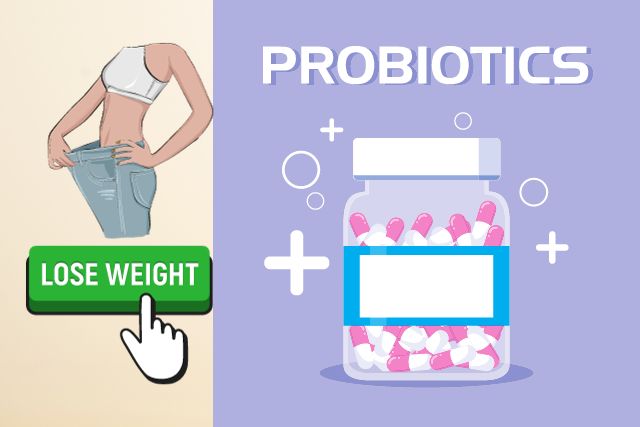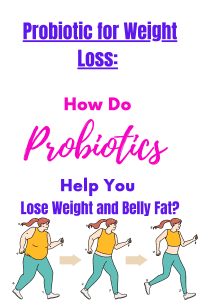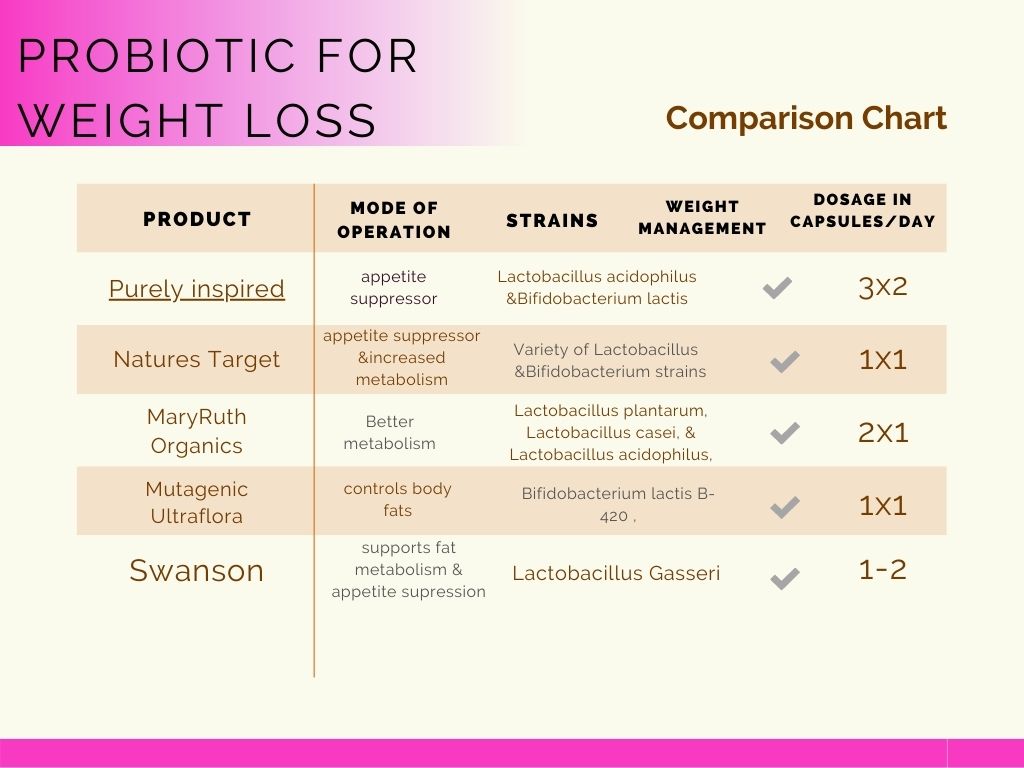Probiotic for weight loss – Do probiotics help you lose weight?
Probiotics for weight loss are live microorganisms found in supplements and fermented foods. According to science, these tiny microorganisms play crucial roles in our bodies.
They help to enhance the gastrointestinal process, improve mental health, treat digestive abnormalities and help keep your skin healthy.
And not just that.
Recent studies reveal that some probiotic strains can help you lose weight and belly fat. And that is the area of our interest today.
But before then, let’s have an overview of probiotics for weight loss and microbiome.
Probiotics and Microbiome
Naturally, hundreds of microorganisms reside in various parts of your body. including the mouth, vagina, and digestive system.
Among these numerous classes of microorganism in our bodies are probiotics.
Probiotics consist of individual microorganisms or microbes living together in a microbiome community. And everyone’s microbiome composition is different.
A microbiome is a community of microorganisms that usually live together in any given habitat.
For you to have a healthy microbiome;
There should exist many different species of microbes.
Both good and harmful.
Hosting a wide variety of bacteria in our gut means they can share different roles. For example, while some help break down foods like fiber, others can help ensure a quick recovery after illness or using antibiotics.
Do Probiotics Change Your Microbiome?
Microorganisms and microbiome formation is a natural occurrence in every individual.
Sometimes though, this natural alignment and microorganisms composition in our bodies may be disrupted by sickness or lifestyle issues. The disruption may end up affecting regular body operation.
The good news, however, is that we have the power to influence and manipulate our microbiome composition primarily through foods.
You can decide which group of bacteria you want to feed through your diet—the bad or the good ones.
Taking multi-strain probiotics has proved effective in temporarily changing your microbiome.
In turn, you can improve your microbiome composition and the efficiency of your natural body processes.
Related:
Do probiotics for weight loss Help You Lose Weight ?
Probiotics can help you lose weight by regulating the number of calories absorbed from food.
They also affect some hormones that directly relate to appetite and fat storage.
Additionally, regularly consuming probiotics can reduce inflammation, a factor known to contribute to obesity.
Do Probiotics Help You Lose Weight? Scientific Reviews
According to a study, probiotics for weight loss can help people with obesity lose weight. This study suggests that the administration of probiotics for about 3 to 12 weeks resulted in participants’ more significant body weight reduction.
The scientific evidence and reviews attach the loss of weight while using a probiotic to their ability to influence appetite and body energy consumption.
Another, study show that probiotics increase your microbiome composition.
As such certain strains may help in the production of short-chain fatty acids like acetate, propionate, and butyrate. Short-chain fatty acids are known to suppress food intake by activating vagal afferent neurons in a series involving the brain.
Similarly, some probiotic strains, like the Lactobacillus family, may inhibit the absorption of dietary fat. This makes your body take fewer calories while excreting more fats through stool.
Additionally,
Probiotics can help with weight loss by helping your body to release appetite-regulating hormones.
The most prevalent hormones that aid in appetite regulation include GLP-1) and peptide YY (PYY). Increasing levels of these hormones may help you burn calories and fats.
Some reviews also suggest that probiotics may reduce systemic inflammation, a factor that has been strongly linked to obesity in many people.
Furthermore, a study by the Journal of Medicinal Food found that people who take probiotics with Lactobacillus gasseri BNR17 strain for 12 weeks significantly decreased their Body weight, BMI, waist, and hip circumferences compared to those who were on the placebo pill.
Probiotic and Obesity; Where is the Link?
The scientific links between weight and some strains of gut bacteria prove that probiotics may have the ability to support weight loss.
Studies show that most obese people have lower bacterial diversity. As such, they must strive to increase microbiome diversity by consuming more mixtures of probiotic strains.
Probiotic foods contain billions of microbes. Eating them can help to increase the diversity of microbes in your gut and create a conducive environment for good bacteria to thrive.
By increasing the microbiome composition, you boost your body metabolism, reduce calorie absorption, reduce inflammation, and enhance digestion. All this factors are crucial for weight management.
How Do You Use Probiotics for Weight Loss?
Probiotics for weight loss help your body to break down food and support a healthy digestive process. They also affect hormones that control appetite and fat storage.
By so doing, they can regulate your eating habits, curb inflammation and reduce calorie absorption.
To get the most out of weight loss probiotics, first, you must choose the right strains.
Many studies have pointed out that a mixture of probiotic strains from Lactobacillus and Bifidobacterium family is better at helping you lose weight.
Also, take your probiotics regularly.
Taking your probiotics daily for a specific period gives the microorganisms time to establish themselves in your gut. They can also multiply and be able to fight off any abnormalities caused by harmful bacteria.
When starting out, give your body time to adjust to the probiotics.
It takes approximately 3 to 12 weeks to establish the effectiveness of certain strains on your body. Start with a lower dosage to reduce the risk of side effects.
Remember to read the manufacturer’s instructions on product composition and usage. This gives you an overview of what you’re consuming. In case of any doubt, do not hesitate to seek your doctor’s advice.
What else should you add to your probiotic supplement to Support weight loss?
A variety of factors can lead to weight gain or obesity. As such, probiotics cannot work in isolation. They may be your best bait for a start; but, you should not stop there.
In addition to taking your weight loss probiotic supplement, watch your diet.
Eat more prebiotic food to nourish your probiotics. Stop eating processed food and sugar with lots of calories.
Instead, add more fruits, vegetables, and whole grains to your diet. These foods are loaded with micro nutrients to support your health and weight loss.
Make exercise part of your daily life. Moving your body will help boost metabolism and burn calories. Above all, ensure you avoid stress and get enough rest.
How Quickly Do Probiotics Work for Weight Loss?
It can take between 3 to 12 weeks of taking a weight loss probiotic supplement before you start noticing any changes in your body.
People react differently. While some may start seeing positive results within the first few weeks of taking their supplement, studies indicate that it can take an average of 6 weeks before others notice a difference.
In case you don’t notice any change within 3 to 12 weeks, you may need to try a different probiotic supplement.
Probiotics are safe, and most do not result in adverse health issues. Be sure to read and follow instructions on the dosage.
Which Probiotics Help With Weight Loss?
The best weight-loss strains belong to the Lactobacillus and Bifidobacterium family.
Probiotics consist of many strains of bacteria. However, studies link certain strains of the Lactobacillus family, like Lactobacillus gasseri and Lactobacillus rhamnosus to losing weight and belly fat.
The first in line is lactobacillus gasseri.
One Research that used rodents proved their anti-obesity properties. According to this study, this probiotic strain can significantly prevent weight gain and fat accumulation.
More studies show that adults taking Lactobacillus gasseri can lose belly fat. However, you must be careful since other research shows that those who stopped using it regained their belly fat within a month.
Additionally, scientific evidence suggests that eating yogurt for about 6 weeks with Lactobacillus fermentum or Lactobacillus amylovorus may help reduce body fat by 3–4%.
Other strains clinically tested and approved for weight loss management come from the Bifidobacterium family, and they include ;
- B. animalis ssp. lactis 420
- B. animalis subsp. lactis CUL-34
- B. bifidum CUL-20
These strains are linked to a good metabolism, lower dietary inflammation, and better blood sugar control.
Most reviews on probiotics’ ability to help in weight control are promising. Women taking the probiotics have been shown to lose as much as 50% more weight in about 3 months than those taking a placebo pill.
How Much Weight Can You Lose by Taking Lactobacillus gasseri?
A recent study involving 210 participants with obesity symptoms found that taking Lactobacillus gasseri for about 12 weeks significantly reduced about 8.5 % of belly fat. Similarly, there was a reduction nn overall body weight. The participant also recorded reduced waist size, hip circumference, and body mass index (BMI).
Affiliate Disclosure: As an Amazon Associate, I get a small commission for purchases made from Amazon.com through links in this post. Learn more about our affiliate disclaimer here.
Best Probiotic for Weight Loss
When shopping for probiotics to assist in your weight loss efforts, it’s important to look for one of the above strains.
Also, be sure to check for the specific strains that can perform the intended purpose. Just because a probiotic contains broad-spectrum probiotics may not necessarily mean that it contains the exact strains that have been shown to be effective for weight loss.
How to choose a probiotic
When selecting a probiotic, consider the following;
- Probiotic strains: Consider products with scientifically tested and proven probiotic strains to help with effective weight management.
- CFU count: Consider a product with a mixture of probiotic strains proven effective for weight loss.
- Third-party testing and safety approvals: Please consider third-party tested products for safety purposes.
- Quality of ingredients: Consider a product with quality and safe ingredients.
Best Probiotics for Weight Loss and Belly Fat
If you’re looking for an excellent probiotic for your womanly needs or to kick-start your weight loss journey, then look no more. Here are our top picks for your needs.
1. Best appetite suppressor –purely inspired
- Contains Lactobacillus acidophilus and Bifidobacterium lactis strains to support weight management.
- Made with prebiotic fiber for probiotic nourishment.
- Contains 98 Vitamins & Minerals. |
- Contains Garcinia Cambogia fruit and green coffee for weight management.
- It contains 1 billion live cultures
- It is gluten-free
Cons
- Keep refrigerated
- Not suitable for pregnant women
- It may keep you awake for some times
- Challenging to swallow 6 capsules daily
2. Best Unflavored powder probiotic for enhanced metabolism ; Natures target powder form
- Supports digestive health, skincare, Gut Health, and Immune system.
- It enhances body Metabolism and, thus, is excellent for energy and weight management.
- It comes in powder form for better absorption.
- 50 Billion CFUs Per Serving
- higher CFUs
- Unique Stomach Acid Protection System
- 10 x more survivability
- Shelf Stable – No refrigeration required.
Cons
- Not suitable for pregnant women
3. Best plant-based probiotic for weight loss support; MaryRuth Organics
- Supports weight loss, Digestive Health, and Gut Health
- Non-GMO
- Gluten-Free
- It is a Vegan Formula with Morosil, Green Tea Leaf, and Garcinia cambogia fruit extract.
- Contains an appropriate blend of strains; Lactobacillus Plantarum, L. casei, L. acidophilus.
- It contains additional organic ingredients: Organic Hypromellose, Organic Rice Bran, Organic Rice Extract Blend, and Organic Rice Hulls.
- Dairy Free, soy-free, Nut Free, Gluten Free, and Sugar-Free.
- Supports better metabolism.
- Third-party tested.
Cons
- Not suitable for pregnant and nursing women. Also, you must consult your healthcare provider if you anticipate surgery or another form of medication.
- some people tend to get mild pimples
4. Best Vegetarian friendly probiotic for weight management; Metagenics Ultraflora
- Great for body weight regulation
- Consists Bifidobacterium lactis B-420 to help in weight management
- Excellent product for vegetarians
- Non-GMO and gluten-free
- Third party certified
- 10 billion CFU
- Works on your body fats
Cons
- Expensive
- not easily available
- Not suitable for pregnant and nursing moms
5. Best Probiotic with excellent fat metabolism support- Swanson
- Contains Lactobacillus Gasseri strain for weight loss support.
- Supports weight loss, Digestive Health, and excellent microbial balance
- supports fat metabolism by converting the body’s fat storage into energy.
- Contains about 3 billion CFU in each capsule.
- Ability to control appetite.
- Made in GMP-certified facilities; independent third-party testing.
- Fitness probiotic that support leptin hormone for controlling hunger.
- Third party tested
Cons
- Not suitable for pregnant and nursing women. Also you must consult your healthcare provider if you are taking medication, or have a medical condition.
Comparison Chart
UP NEXT
- 21 Monthly Healthy Lifestyle Checks for Every Woman With a Growth Mindset
- How Tight? Strengthen Your Vaginal Muscles After Childbirth With These Easy-To-Do Pelvic Floor Exercises
- 16 Ways You Can Boost Fertility In Your 30s
- 7 Powerful Natural Remedies to Get Rid of Yeast Infection in Just 3 Days
DISCLAIMER The information contained in this post is for general information purposes only. I’m not a health practitioner and as such, this information should not be used as a substitute for consultation with your professional service provider.











